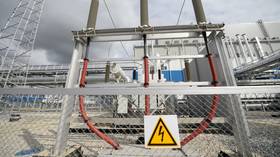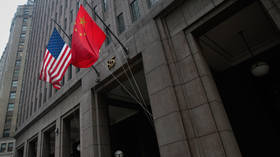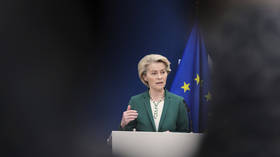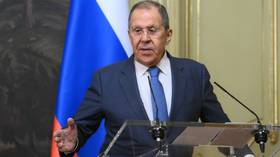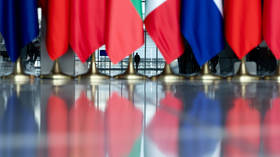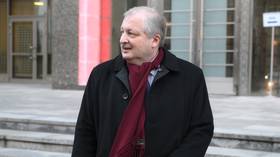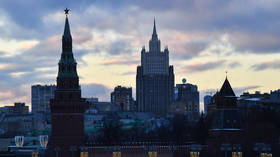‘Current reserve currencies system is inadequate and risky’ – presidential aide
What's on the G20 summit agenda, and what is the most efficient way of handling the economic slowdown? RT speaks to presidential aide Arkady Dvorkovich about the challenges the financial crisis poses to the international
RT: Thank you very much for being with us today. You were involved in preparation of the G20 Summit. Do you think it’s going to be just another case of “all talk and no action,” or can something substantial come out of it this time?
AD: Two circumstances make this Summit important. One is that this Summit follows up on the Washington action plan that was adopted in November and leaders of 20, 20 “plus” countries, and heads of international organizations will review the progress that was achieved after Washington. The second is that the crisis is still going on, there’s no end at this point, and leaders should take further action to deal with the crisis and give hope for people around the world that negative consequences of the financial crisis will be eliminated.
RT: I'm thinking, and tell me if I'm overestimating the summit, this is probably the ultimate test to see, given the economic crisis situation, to see whether the politicians can actually agree on anything and then implement these measures. Am I overestimating the Summit?
AD: Politicians will try to agree on the most important things, on two most important things. One is dealing with the immediate short-term consequences of the financial crisis, particularly for economic growth and jobs, and leaders will reiterate their commitment to provide sufficient fiscal stimulus, and to provide sufficient resources to the international financial organizations that will ensure that the most dangerous risks will be reduced. And the second thing that leaders should agree on is the foundation for future reform of the international financial architecture that would prevent future crisis. And there’s hope that leaders will find consensus on these two issues. It is clear that this is not the last Summit, it’s clear that further work will be needed, and we consider this Summit the second step towards achievement of our important goals.
RT: What about Russia, how does its economic situation look in the context of the world crisis?
AD: Russia’s economic situation is a part of the global economic crisis right now, we are not separated from the rest of the world. Unfortunately, our economy is declining, and as most of the governments, we are trying to deal with these issues in the most efficient way. At least we have accumulated reserves over the last few years, so we have some resources with which to deal with the most crucial issues. On the other hand, we are still undergoing structural reforms that produce higher inflation than in other countries. These two differences imply that the Russian Central Bank and the Russian government are conducting policies in a little bit different way than some other central banks and governments.
RT: Russia says it wants to replace the existing unipolaric economic system with something that will actually be based on interactions between different strongholds. What would those centres be?
AD: I believe that the relative strength of various financial centres will depend on the competitiveness of the respective economies. Over a few decades, it was clear that the United States, some of the European countries, Japan or … the most competitive countries, now China is on the uphill, India, Brazil, Russia, some other countries, and relative strength will be changing further, and with time these new centres will play a more important role. It’s a long-run story, it’s not about overnight changes in the structure of the global economy, but it will happen.
RT: I think another long-run story is probably Russia's proposal to introduce the supernational reserve currency to be issued by different international financial institutions, now this is something that people debate a lot about. I don't really understand much in finance and economics, what type of currency would that be? Would people use it all around the world or is just between the countries? How would you convert it, let's say, between Albania and the US?
AD: These questions are exactly the issues that we would like to have discussed over the next few months. Our idea is to initiate an international discussion academic, professional and political on these issues. We believe that the current system of reserve currencies is inadequate and risky for the global economy; and one idea is to have more reserve currencies based on more financial centres. Another idea is to have a global reserve currency. Relative advantages should be discussed with all the key players in the global economy, and the International Monetary Fund. One of the possibilities is to transform SDR, Special Drawing Rights, that is the currency of the International Monetary Fund, used only for official purposes, into kind of more like a reserve currency that would be used to issue financial instruments, to borrow, and that can be used in international trade as well. But whether it’s a good solution immediately or not we shall see, we should analyze further. Another idea that was fluctuating for decades around the world is to return to the gold standard. It also can be discussed, and we believe that after a few months of discussions we can come to some conclusion and make decisions.
RT: While we're at it, what do you think will happen to the dollar?
AD: Short-term development with the dollar exchange rate will depend on the efficiency of the package that was proposed by President Obama, and it’s clear that there are some short-term risks and medium-term risks. Short-term risks are related to possible insufficiency of the package, medium-term risks relate more to the effect of the losing of the monetary policy on inflation and the exchange rate. It’s not clear at the moment whether the dollar will go down or up because – right now and in the long run, it’s clear that relative strength of other currencies will be increasing with time, given the changes in relative competitiveness of various economies.
RT: Now Russia is also proposing a global watch called SURF-Standard Universal Regulatory Framework, which is more regulations and financial control. Maybe global financial control has another side to the story?
AD: Russia is not talking about more control, more regulation. We believe that we need more efficient and more harmonized, more consistent regulation across countries, and across markets. This is what our idea of SURF is about. We believe that regulations across countries should be coordinated, and also all markets should be regulated in a consistent way. We need a body that will monitor the process, and put together all the regulators. Financial Stability Forum is expanded right now, and Russia’s in the forum, China’s in the forum, and this body can act as a major monitoring sector for a new regulatory framework. Our partners agree that we need to improve various standards, various individual standards. We believe that we need a real framework where standards are put together and regulations are made consistent across the system.
RT: At this point, there are contradictory reports whether the government will continue to support and bail-out major economic players like banks and companies?
AD: The Russian government believes that we don’t need bailouts, our major task is to help people, to provide for new job creation and keeping efficient jobs in the market. Also, this requires keeping enormous systemic companies, systemic banks. It’s not about helping shareholders and bailing out people who prove to be inefficient in the current situation, and we try to provide resources to those markets and those companies that would create a systemic and positive effect on the overall economy. Most of the actions will be conducted through the banking system, we believe that the government should not help – as a rule – individual companies, and most of the resources will be provided for the recapitalization of the major banks. That will in turn transfer resources to the real economy and representatives of the state in the banks will monitor the actions of the banks and see whether they are complying with the goals that were set forth by government and the Central Bank.
RT: I heard you talk on the forum, and you said that government will no longer help private companies, and now they're on their own, right? A lot of people were waiting for a statement like that, because they thought the convergence of business and power were not healthy for the development of the country. Correct me if I'm wrong, how right is it to do that at this point, when the economic crisis is at its peak to say – ok, you're on your own now.
AD: Certainly during the period of the economic crisis, it is difficult to comply with all the rules and all the principles, but we should try. We should follow the major criteria of efficiency, and of long-term sustainability of our policies. It’s very important to preserve competitive conditions, to make sure that taxpayers’ resources are used efficiently, and not for individual companies and individual shareholders, and we will try to do so. We believe that the most efficient thing is to stimulate demand rather than help individual companies. The most efficient thing is to continue reforms, structural reforms, in the sectors where we started to do so, like the energy sector, and we need to continue reform of the financial sector, and to make it competitive in the current environment. If we turn to different policies – just support individual companies – we will lose resources, time, and the credibility of our people.
RT: Russian businessmen took a big gamble by not giving it a second thought when they were gaining credit. Do you think this crisis will teach them how to spend their money more properly?
AD: Increasing opportunities for Russian people has been the major result of the last few years. We believe that we didn’t make a mistake by giving people this opportunity and created market possibilities for people to live partially depending on their future income rather than just by counting, which is part of the Russian story as well. But this crisis will teach us how to keep risks at a low level, not to underestimate potential risk in the financial system, not to overestimate income. And this will make the system more stable, safe for people. This will lead us to more intensive and more active policies to conduct reforms that will improve the ability of people to improve their lives using their own money. This implies that we need to increase labour productivity, we need to increase efficiency –otherwise, will not be able to earn enough money to improve their lives.
RT: What about the lifestyle of the Russian elite, do you think the crisis will change the lifestyle of this lavishness and maybe an understanding that they don't live on their own planet and are part of the society.
AD: Lifestyle is already changing and people are trying to behave. It is clear that in the past, crisis didn’t teach a lot and people returned to their previous lifestyle very quickly. But any crisis comes to an end. I think that this time the story will be different, and people will think twice about purchasing multimillion-dollar yachts and houses. At least, they will think, and this will be an opportunity to create a more positive psychological environment within the country, a more positive attitude of people towards major businessmen and people who earn a lot of money.
RT: I interviewed Peskov, and he said that every statesman needs to tighten their belt. Do you have to change something in your everyday life in terms of spending?
AD: Certainly. It is clear that we had to reduce spending. We cannot take as given a future increase in income, and we need to think about spending our money more carefully. And that’s what we actually did.
RT: Russia greatly depends on its energy supply, which is surrounded with great risk factors. What could be an alternative driving force of the economy rather than the energy supply?
AD: The energy supply for Russia is an important thing, and it’s a part of the Russian economy that provides for stability. Over the last three to four years, the major driving force of the Russian economy was not energy. It was manufacturing and services – and we started to learn how to live without growth in oil production, and production of other commodities. It is clear that we need to complement the competitive energy sector with competitive developments in other industries and in particular – in the services sector and high-tech manufacturing. This will require innovative policies. This will require more spending on research and development. This will require more investments into human capital. And we will do this. But energy will remain one of the major driving forces for innovation itself – nuclear energy, a new generation of traditional power sources, and renewables. All this constitutes a major part of innovative development of the global economy and the Russian economy in particular.
RT: Obama says that politics is the only thing that could actually help sort out this economic crisis. Do you agree?
AD: We agree that politics today, an efficient politics today, is a major precondition for getting out of this crisis. But only consistent behaviour of government, business, and society can actually change the paradigm, can change the model of development that we provide for a successful global story overall, and will prevent further crises to occur in the future.
RT: How much politics are we going to see at this particular G20 summit as opposed to economics?
AD: Leader’s summits are about politics. Leaders will speak about the economy – domestic economies, global economy. But certainly they will take into account public opinion, and potential reaction of discussion from the society. And the most important for them is to show leadership, to show that they are prepared for action in this field and to lead to real changes. Politics is not just about politics. The important thing is that if people gain credibility, then positive change will occur in the economy and in the society overall.
RT: Is the US proposing something that is of particular interest to Russia at the summit?
AD: We work together with our partners on the development of all major proposals, and we have good common ground to reach consensus. The most interesting things are related to new financial regulations. And some proposals are about changing the law facilities of the international financial organizations that would help the poor countries and poor people in particular. And we are working on some other proposals that will be discussed during the summit.
RT: There's a lot of discussion about who is going to be the major player at this summit, some say its China and the US, others say Russia and the US, what do you think?
AD: The good thing about G20 is that it is on equal footing. It is not G8+, a combination of leading groups and other countries. And all leaders will have the same time and the same right to say what they want to say. Given the importance of particular economies of the world, it is clear that major countries, leaders of the major countries will play a more active role. Totally, the host country, Gordon Brown, President Obama, President Medvedev – certainly, the leaders of China and some other countries. European Union countries will be very active there.
RT: The UN secretary general visited Great Britain and the USA before coming to Russia. I believe he's meeting with the president today, he is planning to propose a $1 trillion dollar international stimulus package at the summit. How realistic is that given the economic state of the G20 countries?
AD: Leaders will discuss the size of the stimulus that is needed and all countries already announced packages that will help their own economies or some initiatives to contributing money to international financial organizations. Some new announcements will be made as well. Whether it will be 1 trillion or less or more – leaders will discuss. A more important thing is not the size of the stimulus but the structure, the efficiency of money that will be put into the global economy right now.
RT: Every crisis is a kind of a purge for the economy. What will the Russian economy look like after the clear-out?
AD: It will be a difficult time. The Russian economy will have to change, and the most important thing is to increase efficiency. Our strategy that was announced before is to increase labour productivity and improve energy efficiency, improve the efficiency of the government – it is still the best recipe for this crisis. And we hope that the Russian economy will come out of the crisis more efficient, and more competitive.
RT: Do you think it’s the end of the market economy? What do you think will happen to the post-crisis financial world?
AD: Certainly, the current crisis is not the end of the economy. It’s the end of the economy that was inadequately regulated and the economy where players took excessive risks without giving sufficient attention to the social dimension of the development. This is coming to the end. But the market economy is still the best mechanism now for development of the world.
RT: I believe you are a great chess fan, does that help you in doing your analysis in everyday life?
AD: Chess is one of the good ways to think about life but certainly not sufficient. And if one just uses chess ideas, it can become even dangerous. It’s dangerous to put too many pawns away to achieve even a good result. It’s important to keep in mind that every particular person, as with pawns on the chess set, is important. And probably other games are equally important for our life and policies and healthy lifestyle – the most important things that are considerations to me now.




